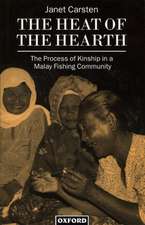Strategies for Survival – The Psychology of Cultural Resilience in Ethnic Minorities
Autor Peter Elsassen Limba Engleză Paperback – 30 iun 1995
Preț: 194.09 lei
Nou
Puncte Express: 291
Preț estimativ în valută:
37.14€ • 38.88$ • 30.73£
37.14€ • 38.88$ • 30.73£
Carte disponibilă
Livrare economică 17-31 martie
Livrare express 28 februarie-06 martie pentru 30.90 lei
Preluare comenzi: 021 569.72.76
Specificații
ISBN-13: 9780814721964
ISBN-10: 0814721966
Pagini: 282
Dimensiuni: 152 x 227 x 18 mm
Greutate: 0.48 kg
Ediția:Revised
Editura: MI – New York University
ISBN-10: 0814721966
Pagini: 282
Dimensiuni: 152 x 227 x 18 mm
Greutate: 0.48 kg
Ediția:Revised
Editura: MI – New York University
Textul de pe ultima copertă
Why does one society survive, while others perish? When two cultures come into contact, how do exploitation, violence, and terror arise? Peter Elsass has been studying cultures in Columbia and Venezuela since 1973. Interested in the survival of various cultures in the face of encroaching white civilization, Elsass has visited and documented the successes and failures of five separate groups struggling to remain independent. Contrasting the Motilon Indians of the Venezuelan lowlands with the Arhuaco of the mountains of Colombia, Elsass describes how the Motilon became spiritually and economically impoverished after the first encounter with Catholic missionaries, while the Arhuaco, possessing a well-organized, hierarchical society, threw out the missionaries in a dramatic move and established their own independent education system. Elsass also describes the Colombian village, Chemescua, the Maroons (a society emerging from slaves), and even the population of Jonestown before its mass suicide, showing how by taking a stand against foreign influences minority cultures can maintain their cultural integrity. This in-depth study of the psychology of survival also contains a lengthy essay on anthropological advocacy prepared with Kirsten Hastrup. In their investigation into the role of the anthropologist in both representing the lives and pleading the cause of the people whom they study, they provide a starting point for a discussion of how to translate concern about the survival of ethnic minorities into action.


















